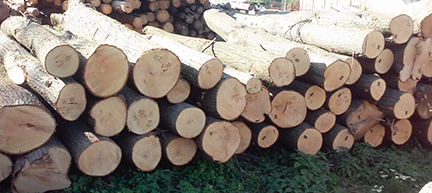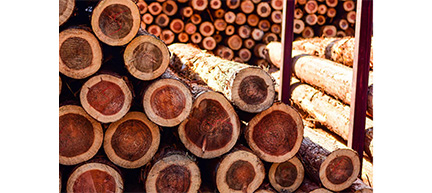In life, we encounter a variety of saunas, each differing in design style, practicality, and durability. For example, outdoor and indoor saunas often require different types of wood. Today, Alphasauna will guide you through the various types of sauna wood and the impact they can have on your sauna experience. Keep reading to learn more.
Different Sauna Wood Type
Whether you're buying a pre-built sauna or customizing your own, the type of wood is a key factor that influences your overall sauna experience. Each wood type offers its own unique color and texture, and their physical properties directly affect temperature retention, aroma, and comfort. Common woods used in sauna construction include red cedar, hemlock, basswood, and pine. Understanding the characteristics of these different sauna woods will not only help you create a comfortable sauna but also craft the perfect private relaxation space.
Heat-Treated Wood: Enhanced Durability
If you're wondering which type of sauna wood is the most durable and long-lasting, heat-treated wood is the answer. This advanced technology not only preserves the wood's natural characteristics but also enhances its properties and aesthetic appeal. Saunas built with heat-treated wood typically have a longer lifespan. The process involves heating the wood to temperatures between 180°C and 240°C in an oxygen-free environment, partially decomposing the organic components within the wood, thus altering its structure and properties.
Key Benefits of Heat-Treated Wood:
Increased Resistance to Moisture and Corrosion
After high-temperature treatment, the internal structure of the wood changes, reducing its water absorption, making it more suitable for humid environments like saunas.
Improved Insect Resistance
One of wood's biggest natural threats is pests, but through heat treatment, the sugars and other nutrients within the wood are broken down, making it less attractive to insects and fungi. As a result, the wood is less likely to be infested or develop mold.
Enhanced Durability
While all types of wood have varying degrees of durability, heat-treated wood’s durability is significantly improved, making it especially suited for harsh outdoor conditions.
Environmentally Friendly
A major advantage of this heat treatment process is that it’s completely natural and chemical-free, making heat-treated wood the ideal choice for families seeking a green, healthy lifestyle.
Reduced Cracking and Warping
The heat treatment process decomposes the organic components within the wood, reducing its hygroscopicity, meaning it absorbs and releases less moisture from the air. This minimizes expansion, shrinking, cracking, and warping, making it an excellent choice for sauna environments.
Unique Appearance
Heat-treated wood takes on a distinct appearance, much like a new hairstyle. The wood darkens, usually transforming into rich shades of dark brown or black-brown, and its natural grain becomes more pronounced, giving it a unique and attractive look.

Basswood Saunas: The Most Hypoallergenic Option
Saunas offer a comfortable way to enjoy heat therapy, but for individuals with sensitive skin, the experience may not be entirely pleasant. Fortunately, basswood is an excellent hypoallergenic material among various sauna woods. Here are some of its key characteristics:
No Resin and Low Volatility
Unlike many traditional woods, basswood is resin-free, which means it doesn’t release resin gases that could trigger allergic reactions in high-temperature environments. Additionally, while many woods emit chemicals or volatile gases when heated, basswood has very low volatility, minimizing irritation to the skin and respiratory system, making it more suitable for allergy sufferers.
No Irritating Smell
In contrast to the natural fragrances of other woods, basswood has a very subtle scent with almost no strong wood aroma or irritating odors, providing users with a comfortable sauna experience.
Smooth Texture
Basswood features fine fibers and a very smooth surface, which minimizes the likelihood of rough burrs. This smoothness is especially beneficial for individuals with sensitive skin, as sauna chairs and backrests made from basswood can reduce discomfort during skin contact, thereby lowering the risk of allergic reactions.
Natural Antibacterial Properties
Unlike cedar, which has strong antibacterial qualities, basswood's low resin and oil content make it less conducive to bacterial and mold growth. This is particularly important in the high-temperature, high-humidity environment of a sauna, as it helps reduce the accumulation of allergens.

Cedar Saunas: A Premium Choice
Cedar Sauna: A Great Choice
Cedar saunas are popular among sauna enthusiasts due to their exceptional characteristics. Unlike other woods, cedar does not expand or contract significantly with temperature fluctuations, making it suitable for both indoor and outdoor use. Additionally, cedar wood has a natural essential oil aroma and possesses strong antibacterial properties.
While the price of cedar wood is higher than that of other woods, its durability, low maintenance requirements, and excellent antibacterial and anti-corrosion properties make it a cost-effective long-term investment. You won’t need to replace or maintain it frequently.
Affordable Pine Wood
For consumers with a reasonable or limited budget who want to enjoy the sauna experience, pine wood is an excellent option. Commonly used in sauna construction due to its good thermal insulation properties, pine wood is economical. However, it does contain a certain amount of resin, which may lead to slight resin exudation at high temperatures. This makes pine wood suitable for home saunas with budget constraints.
Wood Selection for Indoor and Outdoor Saunas
Both indoor and outdoor saunas can provide similar health benefits. However, due to different environmental conditions, the wood used for each type varies. Indoor saunas don’t face extreme weather, allowing for the selection of more aesthetically pleasing woods, such as Western red cedar, hemlock, and poplar.
For outdoor saunas, it's essential to consider the wood's weather resistance, corrosion resistance, and natural insect resistance. Woods like Western red cedar and red pine are ideal choices for enduring long-term outdoor conditions. Additionally, heat-treated wood is a suitable option for outdoor saunas, particularly in changing climates.
Conclusion
While there are various sauna materials available, the best sauna is the one that fits your family's needs. If you're unsure which type of wooden sauna to choose, please contact us. We can help you select the perfect family sauna based on your requirements and regional climate. Furthermore, Alphasauna can customize wholesale saunas according to your preferred type of sauna wood.




